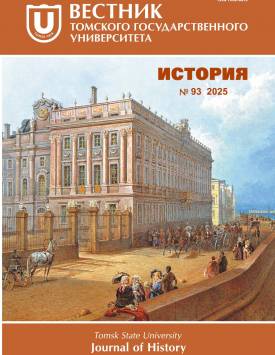Newspaper rumors in the context of military censorship and public practices during the First World War
In conditions of the First World War, rumors regularly appeared on the pages of newspapers, which tried to confirm or deny them. It is difficult to determine the primary and secondary nature of this kind of information: periodicals themselves generated various kinds of speculation, developing them in newspaper publications. Probably, the authors of such publications were confident in their reliability, since they believed that they had received information from “reliable sources.” Using the example of the note “Ridiculous Rumors” from the newspaper “Vecherneye Vremya” (April 21, 1916), using archival sources, it is shown how the publication of a possible ultimatum from Russia to neutral Sweden caused claims against the newspaper from the censorship department, although this rumor was presented with its refutation. Readers were assured that relations between Russia and neutral Sweden are good. Indeed, Sweden was dissatisfied with the English naval blockade, which was aimed at the exchange of goods with Germany. Russia had to coordinate with England its exchange of goods with Sweden regarding its supply of raw materials for possible military purposes and food. The situation was therefore of political and economic importance, requiring caution in public statements. That was the reason why the note in “Vecherneye Vremya” attracted the attention of the Petrograd Military Censorship Commission. Since Petrograd Governorate was under martial law, a preliminary censorship regime was in effect. The note “Ridiculous Rumors” was published without submitting it for preliminary consideration by military censorship, which caused a reprimand to the newspaper. The attitude of the Petrograd Military Censorship Commission to such “news” was negative. It was supposed to prevent the emergence of secret military information in the press and control public opinion on the domestic front about the war, although the abundance of such "news" made it difficult to censor all published newspapers. At the same time, there was also control over publications by the newspaper editors themselves, to avoid disapproval from the censorship. Examples of news created based on unreliable rumors allow us to make conclusion that most of them were generated by the lack of genuine information from reliable official sources. In addition, periodicals wanted to attract the reader’s attention in this way. Sometimes the opposite situation occurred: the newspaper tried to refute the rumor, but its presentation on newspaper pages contributed to increasing the number of assumptions discussed by society. The authors declare no conflicts of interests.
Keywords
World War I, military censorship, periodicals, rumors, Council of Ministers of the Russian Empire, public sphereAuthors
| Name | Organization | |
| Blokhin Valery F. | Bryansk State University | blohin.val@yandex.ru |
| Shevtsov Vyacheslav V. | Tomsk State University | totleben@yandex.ru |
References

Newspaper rumors in the context of military censorship and public practices during the First World War | Tomsk State University Journal of History. 2025. № 93. DOI: 10.17223/19988613/93/4
